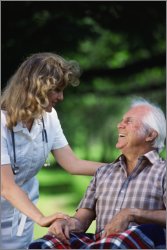The Untold Value of Kindness:
Practical (and Surprising) Reasons to Be a Nicer Person
by www.SixWise.com
The erosion of kindness, at least in the United States, may
be one of the top issues facing the United States. It's easy
to come up with a list of very public signs of this erosion,
from the countless mud-slinging political commercials leading
up to the recent elections to increasing polarity and tensions
among political parties.
|

"The best way to cheer yourself up is to try to
cheer somebody else up."
-Mark Twain
|
That kindness is becoming more of a rarity -- that there
is a "lack of kindness" epidemic, if you will --
is no secret outside of the political arena, either. Shoppers
pushing by one another at the supermarket, rather than saying
"excuse me;" more tailgating
and people cutting each other off on the road; increases in
bullying
at schoolyards ... the list can go on and on.
There are many obvious social reasons to be kind. There are
other less obvious but very practical reasons as well, though,
and perhaps if these reasons were more widely known, the kindness
bug may come back into fashion.
Why Be Kind?
Being kind is not totally altruistic. It actually has a lot
of benefits for the giver, as doing kind deeds is healthy.
One of the largest studies of kindness was conducted by Allan
Luks, former executive director of the Institute for the Advancement
of Health and author of the book "The
Healing Power of Doing Good."
He surveyed over 3,000 volunteers about how they felt when
they did a kind act, and found that those who helped others
had better health.
"Helping contributes to the maintenance of good health,
and it can diminish the effect of diseases and disorders both
serious and minor, psychological and physical," Luks
said.
Among the most significant of Luks' findings was a "helper's
high" that 95 percent of the volunteers reported feeling.
The "helper's high" reduced stress and released
endorphins, the body's natural painkillers. After the high
subsided, volunteers reported feeling an extended period of
improved emotional well-being.
|

Life's most persistent and urgent question is, 'What
are you doing for others?' "
- Martin Luther King Jr.
|
"This feeling of well-being is critically important,"
Luks said. "Studies have documented the fact that raising
a person's perceived health status leads to reductions in
stress that can create actual health improvements. Most important
for the purposes of this study, respondents to the helping
survey frequently dated the perceived improvement in their
health to the beginning of their helping efforts."
Other findings of Luks' study included that helping:
-
Reverses feelings of depression, hostility, isolation
and helplessness
-
Enhances feelings of joy, self-worth, emotional resilience
and optimism
-
Decreases the awareness and the intensity of physical
pain
-
Supports the immune system
In helping to support the immune system, Luks says it's possible
that the act of helping may even slow the progress of cancer
and other illnesses. He says:
"All we know at this point is that different states
of mind do affect the immune system, which is responsible
for resisting the growth of a tumor. But there is no proven
relationship of these attitudes to either getting cancer
or being able to fight it. On the other hand, some initial
research reveals a possible link. Helping behaviors produce
the kinds of emotions and the stress reduction that might,
according to these studies, slow the progress of cancer.
Case in point: Research by psychologist Sandra Levy found
that joyfulness -- defined as emotional resilience and vigor
-- was the second most important predictor of survival time
for a group of women with recurring breast cancer. Helping
can enhance our feelings of joyfulness and reduce the unhealthy
sense of isolation."
A "Biological Reward for Doing the Right Thing"
Dr. Paul Ka'ikena Pearsall, author of "The
Pleasure Prescription," has done interesting work
in a field known as psychoneuroimmunology (PNI).
PNI looks into the relationship between behaviors, psychosocial
factors, and the body, and its resistance to disease. His
book is based on an ancient Polynesian concept known as "Aloha,"
which encompasses five principles (patience, unity, agreement,
humility and kindness) as the cornerstones of physical and
emotional well-being.
"Over the last three decades, PNI has documented remarkable
new ways in which we can fight off disease and heal when we
are sick. In just three decades, it has amassed dramatic --
albeit incomplete -- evidence of what the Polynesians already
knew: that psychological factors influence the body's ability
to control symptoms and recover from catastrophic illness,"
says Pearsall.
|

"Goodness is the only investment which never fails."
- Henry David Thoreau
|
"Akahai," or kindness, particularly when it involves
strangers, has benefits for the immune system and for healing,
according to Pearsall.
"In concrete terms, there seems to be a biological reward
for doing the right thing," he says.
Kindness is Catchy
One thing's for certain: with all the benefits kindness lends
to mind and body, a kind society stands to reap major rewards.
And, it seems, kindness has a way of catching on.
The Seattle Times recently reported on just that. From patrons
at a local restaurant randomly paying for another diner's
meal, someone buying someone else a coffee at Starbucks, and
a man handing out free bottled water and juice to visitors
at a local beach, kindness evokes more kindness.
According to one woman who had a dinner bought for her by
an anonymous, kind stranger, ""I told my friends
about it and the first thing they said was they'd like to
do something like that. So it spreads."
And although society is riddled with "what's in it for
me" relationships, which certainly have their place,
we can all strive to do some kind acts without expecting anything
in return.
"In the modern world, we have a lot of relationships
that provide reciprocal benefits: I'll scratch your back and
you scratch mine ... those sorts of contractual relationships,"
says William Talbott, philosophy professor at the University
of Washington.
But, he continues, "We can say, 'I just want to do something
good for you without the expectation of getting anything in
return at all.' And what a thrill it is to be on either side
of that statement -- the giver or the receiver."
Recommended Reading
How
(and Why) to Teach Kids to Care: What Amazing New Studies
Suggest
How
to Drop the Drama and Master the Art of Loving Simply in Seven
Easy Steps
Sources
The
Random Acts of Kindness Foundation
The
Seattle Times